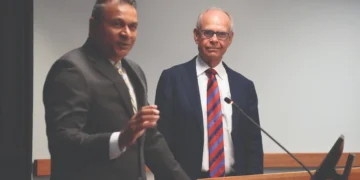Novelist Randy Wayne White just closed on a real estate deal that’s short on price but big on history with a positive outlook on the future of citrus farming.
White, author of more than 20 novels about marine biologist and retired spy Doc Ford, paid $675,000 on Dec. 21, for an 800-square-foot home on Bokeelia on Pine Island. It comes with a barn and 5 acres of land on which White plans to do experimental citrus farming.
The home also comes with some history, as it was built in 1910 by fishing boat Captain John Smith, who helped jumpstart development in Southwest Florida when he landed the first tarpon fish caught by rod and reel.
 “In 1885, he took a New Yorker named W.H. Wood — William Halsey Wood — an avid angler,” White said. “And Captain Smith and Mr. Wood landed the first tarpon ever landed by rod and reel, on Tarpon Bay. And it changed everything on this coast, economically and socially.
“In 1885, he took a New Yorker named W.H. Wood — William Halsey Wood — an avid angler,” White said. “And Captain Smith and Mr. Wood landed the first tarpon ever landed by rod and reel, on Tarpon Bay. And it changed everything on this coast, economically and socially.
“It was the first big game fish that could be landed from a rowboat. This was a big deal. It made headlines in the London Times. It went around the world. Wealthy people who normally would have gone to Palm Beach started coming here. To Lee County. Southwest Florida. It begat railroad tracks being laid. Railroad schedules down to Boca Grande. It begat building hotels. They began building roads. The tarpon changed everything on this coast.”
For White, a former fishing guide himself, the acquisition brought both him and the property full circle.
“It’s not just historic,” White said. “If I believe in mysticism, I would have the full-circle symmetry of an old fishing guide buying Captain Smith’s house.”
Now that White has bought the property, he intends to get started soon with farming on it. The author of One Deadly Eye and the forthcoming Tomlinson’s Wake said he also plans to do some writing there.
 White said he and his partners have two biotech patents on a citrus root that seems to be resistant to greening, a disease that has devastated the citrus industry in recent years.
White said he and his partners have two biotech patents on a citrus root that seems to be resistant to greening, a disease that has devastated the citrus industry in recent years.
White plans on growing that root on his new property.
“If a citrus tree grows in an isolated area, where it cannot cross pollinate it with other citrus, the seeds it drops, it’s the perfect DNA clone of a mother tree,” White said. “It’s the only citrus I’m aware that has not gotten citrus greening. It is also incredibly salt intolerant. We’re probably going to plant about 20 on the John Smith property. It’s great soil.”
White said he hopes the experiments will pay off for Florida’s farmers in the future.
“Citrus is such a Florida mainstay,” White said. “I would love to, in some way, if it turns out, to help that industry. If it flourishes…. It’ll be pretty cool.”





